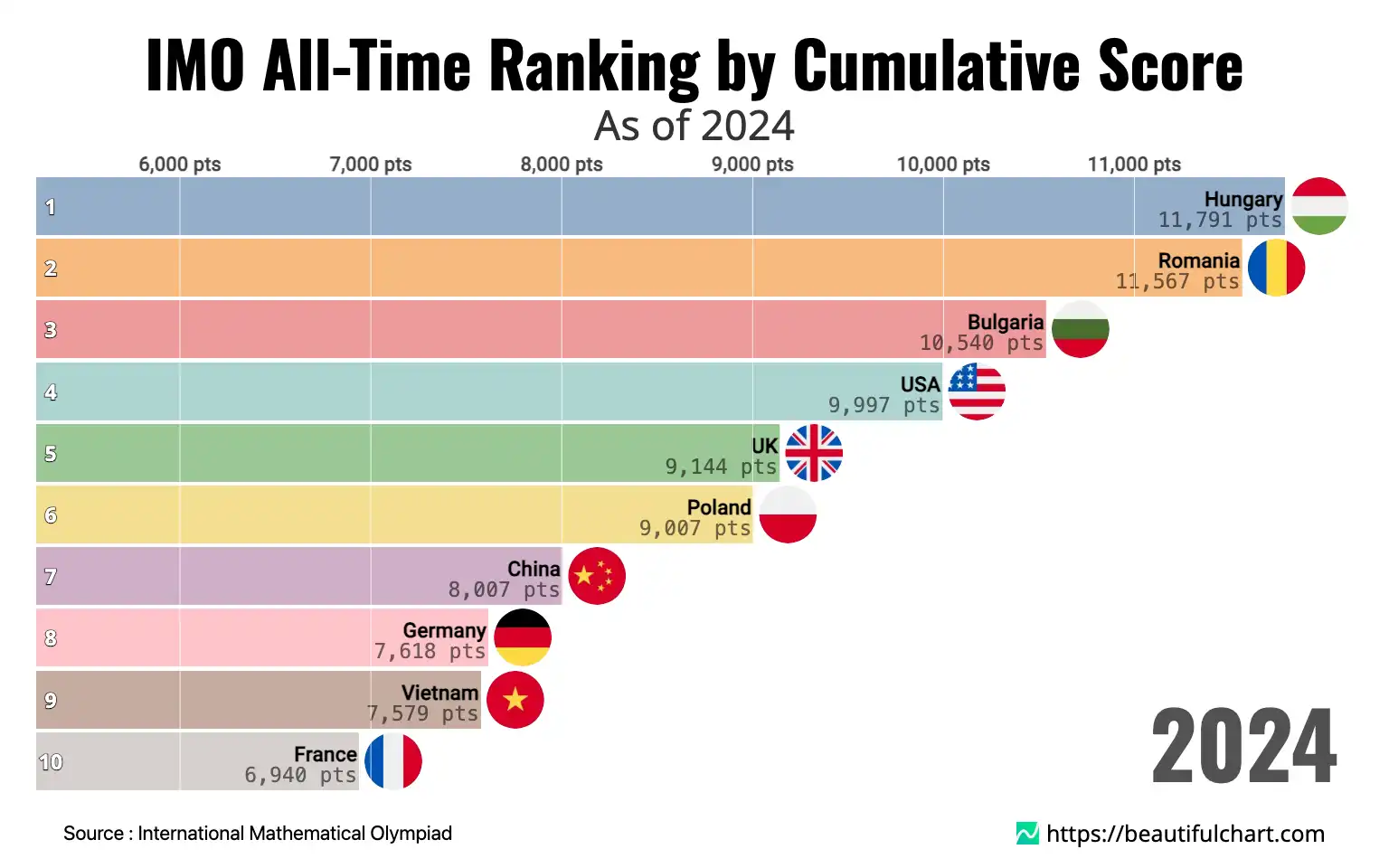The International Mathematical Olympiad (IMO) showcases the world's brightest young mathematicians, with a consistent display of excellence from several nations. Historically, countries like Hungary, Romania, and Bulgaria have demonstrated remarkable sustained performance, accumulating significant total points over many years. This pattern highlights their enduring commitment to advanced mathematics education and talent development. The competition serves as a critical benchmark for national scientific and educational prowess.

International Mathematical Olympiad: The International Mathematical Olympiad (IMO) is the world championship mathematics competition for high school students. It is the oldest of the International Science Olympiads, first held in 1959, and is typically held annually, fostering mathematical talent and promoting global understanding through education.
The International Mathematical Olympiad (IMO) stands as the pinnacle of global mathematical competitions for pre-university students, serving as a powerful indicator of national aptitude and investment in mathematical sciences. Analyzing the cumulative scores across multiple editions reveals profound insights into the long-term mathematical excellence of participating countries.
Throughout its history, a select group of nations has consistently demonstrated exceptional performance. Hungary, for instance, has maintained a remarkable presence at the top, reflecting a deep-rooted tradition of mathematical education and a robust system for nurturing prodigies. This sustained success is not merely a reflection of individual talent but also of comprehensive educational frameworks that prioritize and cultivate advanced problem-solving skills from an early age. Similarly, Romania and Bulgaria have frequently ranked among the leading contenders, underscoring a strong legacy in the field and effective national programs designed to identify and train future mathematicians.
The competitive landscape of the IMO also illustrates the geopolitical shifts and educational priorities over the decades. Historical entities such as the USSR, Czechoslovakia, and East Germany once held prominent positions, showcasing the significant emphasis placed on STEM education within those nations during specific eras. The eventual dissolution of these states and the emergence of new participants or a restructuring of existing ones have subtly altered the composition of the top ranks, yet the underlying principles of rigorous mathematical training remain constant for success.
The United States, while not having the same deep historical cumulative lead as some European counterparts, has steadily grown in its competitive standing, especially in more recent periods. Its performance signifies the growing importance placed on cultivating mathematical talent within a diverse educational system. The increasing presence and strong showings from countries like the USA highlight a global recognition of mathematics as a foundational discipline for innovation and technological advancement.
Cumulative scores, as opposed to single-year results, provide a more accurate and robust measure of a nation's enduring mathematical strength. They filter out year-to-year fluctuations and emphasize a consistent ability to produce top-tier talent over extended periods. This long-term perspective suggests that success at the IMO is not a matter of chance but a product of dedicated national strategies, highly skilled educators, and a culture that values intellectual rigor and abstract reasoning. The continuous participation and striving for high scores underscore a commitment to developing the analytical capabilities essential for addressing complex global challenges in science, technology, engineering, and economics.
Furthermore, the IMO acts as a catalyst for international collaboration and cultural exchange among young mathematical enthusiasts. It fosters a global community of problem-solvers, where participants not only compete but also learn from one another, sharing methodologies and perspectives. The pursuit of excellence in this arena transcends national borders, contributing to the universal language of mathematics and enriching the global pool of intellectual capital. The sustained achievements of nations at this level reflect a strategic investment in human capital, positioning them favorably in the ongoing global competition for scientific and technological leadership.
Key Takeaways
Consistent Dominance and Historical Prowess
- Hungary has consistently led in cumulative points, demonstrating a long-standing tradition of excellence in mathematics education and talent nurturing.
- Romania and Bulgaria have also maintained strong historical positions, frequently appearing among the top-performing nations, underscoring their robust educational systems.
- The early prominence of historical entities like the USSR and East Germany highlights past national investments in STEM fields, shaping the early landscape of the competition.
Evolving Global Landscape of Mathematical Talent
- The United States has shown significant growth in its cumulative performance, especially in more recent periods, reflecting an increased focus on developing mathematical prowess within its diverse educational system.
- The presence of various nations across different eras indicates a shifting global distribution of mathematical talent and national priorities in education.
- Cumulative scores offer a deeper understanding of sustained excellence, showcasing a country's consistent ability to produce top-tier mathematicians over decades rather than focusing on singular achievements.
Implications for National Development
- Success in the IMO serves as a strong indicator of a nation's commitment to advanced scientific and technical education, crucial for innovation and economic growth.
- The competition fosters a culture of rigorous mathematical thinking and problem-solving, skills that are foundational for advancements in science, technology, engineering, and various other fields.
- Sustained national performance in the IMO reflects effective talent identification programs, dedicated training, and a supportive educational environment that prioritizes intellectual development.
Top Ranking
1st Hungary (11,791 pts)
Hungary has consistently been a powerhouse in the International Mathematical Olympiad, showcasing unparalleled sustained excellence in the field. Their leading cumulative score of 11,791 points by 2024 is a testament to a deep-rooted and historically rich tradition of mathematical education. This consistent top-tier performance highlights a national commitment to nurturing young mathematical talent through rigorous training programs and a strong academic foundation, firmly establishing Hungary as a global leader in fostering mathematical brilliance.
2nd Romania (11,567 pts)
Romania stands as another formidable contender in the IMO, with an impressive cumulative score of 11,567 points. This nation has consistently demonstrated high levels of mathematical proficiency among its students, often rivaling the top-ranked countries. Romania's strong performance reflects its robust educational system, which places a significant emphasis on mathematics, cultivating an environment where young minds are challenged and encouraged to excel in complex problem-solving. Their consistent success underscores a sustained national effort in academic excellence.
3rd Bulgaria (10,540 pts)
Bulgaria has also carved out a significant place in the history of the International Mathematical Olympiad, securing a cumulative total of 10,540 points. This achievement speaks to Bulgaria's strong educational heritage in mathematics, consistently producing highly skilled participants. The nation’s continued presence among the top ranks highlights the effectiveness of its specialized math schools and dedicated coaching programs, which are instrumental in preparing students for the rigorous demands of the IMO, affirming its position as a key player in global mathematical education.
4th USA (9,997 pts)
The United States has progressively strengthened its standing in the IMO, achieving a cumulative score of 9,997 points. While some European nations have a longer historical lead, the USA's performance demonstrates a rising commitment and success in cultivating mathematical talent. This strong showing reflects investments in STEM education, the development of advanced mathematics curricula, and the dedication of various organizations and mentors who prepare students for this elite competition, showcasing the evolving landscape of mathematical excellence.
5th UK (9,144 pts)
The United Kingdom holds a commendable position with a cumulative score of 9,144 points in the International Mathematical Olympiad. The UK's consistent presence in the top ranks indicates a strong foundation in mathematical education and a commitment to fostering high-achieving students. This sustained performance is a result of dedicated educational programs and national initiatives aimed at identifying and developing young mathematicians, enabling them to compete effectively on the world stage and contribute to the nation's intellectual capital.
| Rank | Name | Indicator |
|---|---|---|
1 | 11,791 pts | |
2 | 11,567 pts | |
3 | 10,540 pts | |
4 | 9,997 pts | |
5 | 9,144 pts | |
6 | 9,007 pts | |
7 | 8,007 pts | |
8 | 7,618 pts | |
9 | 7,579 pts | |
10 | 6,940 pts | |
11 | 6,900 pts | |
12 | 6,171 pts | |
13 | 6,081 pts | |
14 | 5,783 pts | |
15 | 5,694 pts | |
16 | 5,690 pts | |
17 | 5,569 pts | |
18 | 5,533 pts | |
19 | 5,478 pts | |
20 | 5,382 pts |





